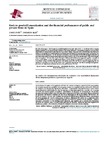Back to Goodwill Amortisation and the Financial Performance of Public and Private Firms in Spain

Use this link to cite
http://hdl.handle.net/2183/38726
Except where otherwise noted, this item's license is described as Atribución-NoComercial-SinDerivadas 4.0 Internacional (CC BY-NC-ND)
Collections
- Investigación (FEE) [923]
Metadata
Show full item recordTitle
Back to Goodwill Amortisation and the Financial Performance of Public and Private Firms in SpainAlternative Title(s)
La vuelta a la amortización del fondo de comercio y la rentabilidad financiera de las empresas públicas y privadas en EspañaDate
2024Citation
Peón, D., & Ruiz, F. (2024). La vuelta a la amortización del fondo de comercio y la rentabilidad financiera de las empresas públicas y privadas en España: Back to goodwill amortisation and the financial performance of public and private firms in Spain. Revista de Contabilidad - Spanish Accounting Review, 27(1), 146–159. https://doi.org/10.6018/rcsar.503021
Abstract
[Abstract] We take advantage of the change in goodwill regulation in Spain after 2016, to contribute with a comprehensive analysis of a scenario barely studied in the recent literature: the inverse transition from goodwill impairment to the systematic amortisation of goodwill. Using a database with the individual financial statements of all Spanish non-financial firms, both listed and non-listed, with positive goodwill on balance, we contribute in two instances. On the one hand, we seek to obtain evidence of whether managers behaved opportunistically during the impairment regulation period using a test of the determinants of goodwill impairment recognition. On the other hand, through a differences-in-differences approach against a sample of 4,000 control firms, we test the differential impact of the change in regulation on the return on assets of those firms with goodwill in their balances. Our results are in line with extant research suggesting that the systematic amortisation of goodwill paired with a periodic impairment test limits earnings management practices and help investors assess the economic performance of a firm. [Resumen] Aprovechamos el cambio en la regulación del fondo de comercio en España a partir de 2016, para analizar un escenario escasamente estudiado en la literatura reciente: la transición inversa del deterioro del fondo de comercio a la amortización sistemática del mismo. Construyendo una base de datos a partir de los estados financieros individuales de todas las empresas no financieras españolas, cotizadas y no cotizadas, con fondo de comercio positivo en balance, contribuimos a la literatura en dos instancias. Por un lado,
tratamos de obtener evidencia de si los gestores se comportaron de forma oportunista durante el periodo de regulación del deterioro mediante un test de los determinantes del reconocimiento del deterioro del fondo de comercio. Por otro lado, mediante un enfoque de diferencias en diferencias frente a una muestra de 4.000 empresas de control, comprobamos el impacto diferencial del cambio en la regulación sobre la rentabilidad de los activos de aquellas empresas con fondo de comercio en sus balances. Nuestros resultados concuerdan con las investigaciones existentes, que sugieren que la amortización sistemática del fondo de comercio, junto con una prueba periódica de deterioro, limitan las prácticas de gestión de beneficios y ayudan a los inversores a evaluar los resultados económicos de una empresa.
Keywords
Goodwill impairment
Goodwill amortisation
IFRS 3
IAS 36
SFAS 142
Excessive optimism
Deterioro del fondo de comercio
Amortización del fondo de comercio
NIIF 3
NIC 36
SFAS 142
Optimismo excesivo
Goodwill amortisation
IFRS 3
IAS 36
SFAS 142
Excessive optimism
Deterioro del fondo de comercio
Amortización del fondo de comercio
NIIF 3
NIC 36
SFAS 142
Optimismo excesivo
Editor version
Rights
Atribución-NoComercial-SinDerivadas 4.0 Internacional (CC BY-NC-ND)
ISSN
1988-4672






